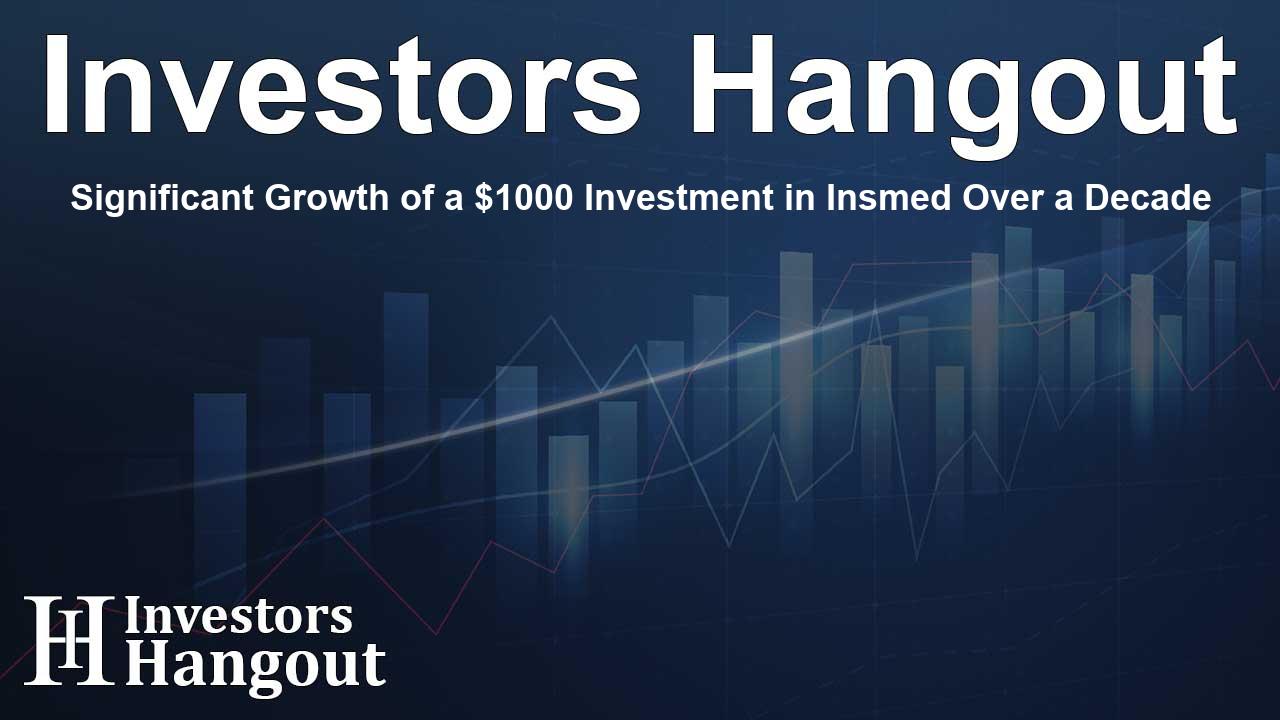Significant Growth of a $1000 Investment in Insmed Over a Decade

Understanding the Growth of Insmed Investments
Insmed (NASDAQ: INSM) has made a remarkable impact in the market over the last decade, consistently outperforming financial expectations. With an annualized return of 25.23%, the company's performance has exceeded market benchmarks by 12.7%.
Ten Years of Robust Returns
If you were an investor who decided to invest $1000 in Insmed a decade ago, you would be pleased to know that this amount has grown significantly. Today, your initial investment would be valued at approximately $9,210.90, demonstrating the powerful effects of compound interest and consistent growth.
The Power of Compounding
The awe-inspiring growth of your investment exemplifies the importance of compounding returns. When investments grow, their profits are reinvested, leading to even greater returns in the long run. This cycle can significantly increase the value of investments over time.
Current Market Capitalization
Presently, Insmed boasts a market capitalization of $41.43 billion, affirming its strong position within the healthcare industry. This robust valuation reflects investor confidence and the company's commitment to innovation and growth.
Implications for Future Investments
Investors should carefully consider the implications of making similar investments today. The historical performance of Insmed provides a compelling case for its potential future growth, and the company's ability to innovate keeps it relevant in a rapidly evolving sector.
Factors Affecting Insmed's Future Performance
Several elements contribute to Insmed's trajectory. This includes the ongoing development of its pharmaceutical products, strategic partnerships, and response to market demands. Staying informed about these dynamics is crucial for potential investors.
Final Thoughts on Investing in Insmed
Investing in companies like Insmed can be rewarding. The example of transforming a $1000 initial investment into over $9,000 serves as a perfect example of how smart investing can turn into wealth accumulation. The landscape for biopharmaceuticals is evolving, providing further opportunities for growth.
Frequently Asked Questions
What does Insmed focus on?
Insmed primarily focuses on developing innovative therapies for serious lung diseases, offering unique solutions to healthcare challenges.
How has Insmed's stock performed historically?
The stock has demonstrated exceptional annualized returns, outperforming many benchmarks in its sector.
Can I still invest in Insmed stock now?
Yes, potential investors can purchase Insmed stock through various brokerage platforms, considering its past performance and growth potential.
What is compounding interest?
Compounding interest refers to the earnings on an investment that earn interest themselves, which can significantly accelerate wealth growth over time.
How does market capitalization affect stocks?
Market capitalization provides a snapshot of a company's value in the market, influencing investor perceptions and stock price movements.
About The Author
Contact Dylan Bailey privately here. Or send an email with ATTN: Dylan Bailey as the subject to contact@investorshangout.com.
About Investors Hangout
Investors Hangout is a leading online stock forum for financial discussion and learning, offering a wide range of free tools and resources. It draws in traders of all levels, who exchange market knowledge, investigate trading tactics, and keep an eye on industry developments in real time. Featuring financial articles, stock message boards, quotes, charts, company profiles, and live news updates. Through cooperative learning and a wealth of informational resources, it helps users from novices creating their first portfolios to experts honing their techniques. Join Investors Hangout today: https://investorshangout.com/
The content of this article is based on factual, publicly available information and does not represent legal, financial, or investment advice. Investors Hangout does not offer financial advice, and the author is not a licensed financial advisor. Consult a qualified advisor before making any financial or investment decisions based on this article. This article should not be considered advice to purchase, sell, or hold any securities or other investments. If any of the material provided here is inaccurate, please contact us for corrections.
